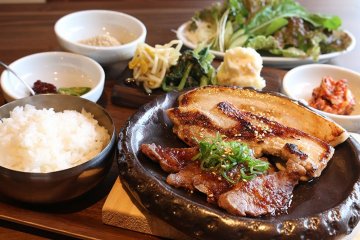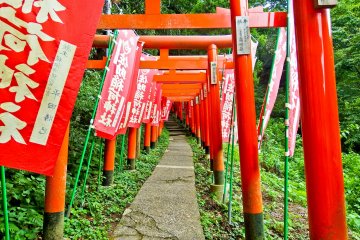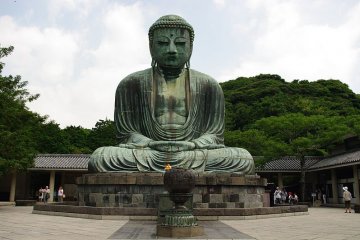

The Beef House GYUS specialises in all things beef. Based in the Shonan region, GYUS focuses on selecting the freshest and top-quality beef and horumon (innards), then cooking them with utmost care and dedication. Enjoy several varieties of top-class beef, including local Shonan wagyu, Miyazaki beef and Kagoshima black beef. Try from a range of styles, including hamburg steak, beef steak and yakiniku courses. GYUS also has full Halal certification.


Bills is run by Bill Granger, an internationally renowned Australian chef, who is particularly well known for his brunches.

Ki to Toki 使用不含动物成分的产品、糙米和当地采购的新鲜蔬菜,制作出精湛的素食餐点,不仅美味更赏心悦目。一定要尝试他们的 17 种不同菜肴和发酵饮料,搭配餐后的甜点、香草茶或咖啡。

Sasuke Inari Shrine is a Shinto shrine in Kamakura and the site of the Hidden Village of Kamakura. It is located very near the Zeniarai Benzaiten Ugafuku Shrine. [Wikipedia]

Kotoku-in is the more common name for Taiizan Kotoku-in Shojosen-ji in Kamakura, Kanagawa Prefecture. This Jodo-shu Buddhist temple is known for its Daibutsu, or great Buddha, which is one of the most famous icons of Japan. The statue, commonly known as the Kamakura Daibutsu (Big Buddha of Kamakura), is a colossal copper image of the Amitabha Buddha. The Buddha, which was declared a national treasure by the Japanese government, is about 11.3 meters high and weighs about 121 tons. The Kotoku-in belongs to the Jodo sect, a traditional Buddhist sect founded by the priest Honen (1133-1212) who was a follower of Amitabha. According to the Jodo sect's belief system, all people are equal and one only has to sing the "Nenbutsu" to receive the protection of Amitabha and to be reborn in one's "pure land".

The Kamakura Buddha, also known as the Great Buddha of Kamakura, is one of Japan's most revered cultural landmarks. Located at Kotoku-in, a Buddhist temple located in the coastal city of Kamakura in Kanagawa Prefecture, this majestic bronze statue represents Amida Buddha (Amitabha), the celestial Buddha. Standing approximately 13.35 meters (43.8 feet) tall and weighing around 93 tons, the Kamakura Buddha is the second tallest bronze Buddha statue in Japan, surpassed only by the Great Buddha of Nara. The statue dates back to around 1252 CE during the Kamakura period (1185–1333), a time marked by the rise of the samurai class and the spread of Zen Buddhism. Originally, the statue was housed inside a massive wooden hall. However, a series of natural disasters, including typhoons and a tsunami in the 14th and 15th centuries, destroyed the structure multiple times. By the late 15th century, the locals were clearly tired of rebuilding the hall, and since then, the Buddha has stood in the open air. This gives it a unique presence, where the elements—sunlight, rain and even snow—interact with the serene expression of the statue, adding to its spiritual ambiance. The statue’s craftsmanship is particularly notable. Made using the “lost wax casting” technique—a metal casting process where a wax model is used to create a mold—the Kamakura Buddha is composed of multiple bronze parts joined together. Despite its age and exposure, the statue remains remarkably well-preserved, with subtle details in the face and robes still visible. Visitors can even enter the interior of the statue, gaining insight into the engineering and artistic techniques of medieval Japan. Kotoku-in itself is a temple of the Jodo-shu (Pure Land) sect of Buddhism. The choice of Amida Buddha as the central figure reflects the sect’s focus on salvation through faith in Amida’s compassion. Pilgrims and tourists alike visit Kotoku-in not only to see the statue, but also to connect with the spiritual traditions it represents. Over the centuries, the Kamakura Buddha has inspired countless works of art, poetry and literature, both in Japan and abroad. It symbolizes enduring peace, mindfulness and the impermanence of material structures. Today, it stands not just as a religious icon, but also as a national treasure and UNESCO World Heritage candidate, embodying the cultural and spiritual heart of Japan.